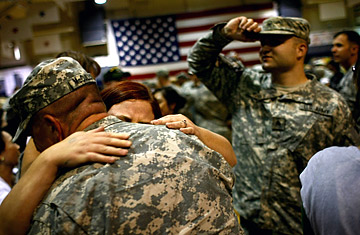
A couple embraces as U.S. Army soldiers return home from Iraq on Aug. 29, 2009 in Fort Carson, Colo.
Veterans Day traditionally is when the nation thanks those who have served in the nation's armed forces, especially in a time of war. But as much as our gratitude, what the 1.8 million U.S. troops back home from Iraq and Afghanistan want is to be asked to serve again, this time on the home front. That, at least, is the conclusion of a new study that highlights many vets' hunger to serve in their communities and their frustration that their talents aren't being tapped. "We now know that veterans who serve" their communities after shedding their uniforms "have better transitions," says John Bridgeland, chief of Civic Enterprises, the public-policy group that conducted the landmark survey, which was funded by Target and the Case Foundation.
"We don't need handshakes and victory parades," says Alex Lemons, 30, who spent eight years in the Marines as a scout-sniper, including four tours in Iraq, before leaving the service last month. "We need to come back and see that people are ready to put us to work after we've been out there on their behalf doing some crazy dirty work." The stresses of deployment leave some veterans unable to reach out to help, but many are eager to do so just the same, which could help smooth their transition back to civilian life. "Getting involved in volunteer projects helps you get out of your own self-pity and pain," says Lemons, who has volunteered with environmental groups near his San Clemente, Calif., home. "It helps me reintegrate into society and not feel so alienated."
This first extensive survey of these all-volunteer vets shows that 92% want to serve their communities once they return home, and nearly as many believe their service should stand as an example for those who haven't served. Less than half of the 779 veterans who responded feel engaged in their communities, and only 13% strongly feel their transition back to civilian life is going well. "They are a vulnerable population, especially during the transition home," says the study. Those rocky returns have led to higher-than-average rates of homelessness, unemployment and suicide; the shootings at Fort Hood last week highlight just how malignant the stresses of military service can be.
And not surprisingly, many people have found themselves trying to lend veterans a helping hand rather than asking for their help. While 7 out of 10 returning vets were offered a service from local do-gooders, only 1 in 5 was asked to serve. In particular, veterans say they are eager to serve by helping other veterans, aiding in disaster relief, helping the elderly and troubled kids and protecting the environment.
"Even though we're veterans and out of the service, we're still here for the community," says Shaun Tapie of Bellingham, Wash. The 25-year-old pulled two infantry tours in Iraq before leaving the Army last year. He recently spent a weekend with several fellow vets helping clean up an elderly lady's yard. "It was awesome just to be able to still help," he says. "We're not sitting there on corners asking for quarters."
The nation's top military officer agrees. "We are, after eight long years of war, creating not just a new generation of veterans, but a new generation of leaders," Admiral Mike Mullen, Chairman of the Joint Chiefs of Staff, says in a forward to the study. "This report is evidence that veterans from Iraq and Afghanistan are ready to reconnect to their communities; they just don't have access to our knowledge of all the pathways to do so."
